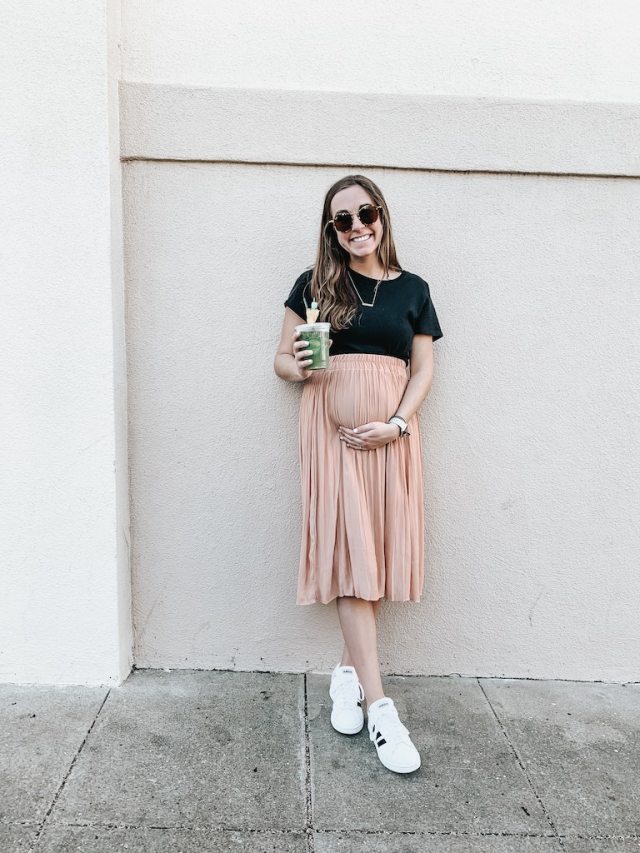
The start of the new year is perhaps the most common time for people to begin a new healthy eating regimen or go on a diet. While traditional dieting is off the table, women entering the new year with a new pregnancy may find themselves wondering how best to eat mindfully to support themselves and their unborn children.
These five healthy pregnancy eating tips will help you get some of the essentials down. If you have any specific concerns, always contact your trusted care provider.
Here are some of the most common questions I receive from pregnant women about how to manage diet during pregnancy.
1. What kind of diet helps control morning sickness?
Eat a balanced diet with equal parts protein, fat, and carbohydrates. This is not a time for low- or high-carb or specialized diets.
Especially during the first trimester, low blood sugar can cause problems, from nausea to not feeling like eating. When you wake up in the morning, eat a couple of crackers and drink some water or juice, then lie back down in bed and let the food get into your system. When you do get up, you should feel more like eating. That’s the time to eat a small amount of protein, fat, and carbohydrates. Then take your shower. It’s hard to even imagine that the timing of a shower can cause nausea, but it does. It is the combination of low blood pressure and low blood sugar.
2. How do I eat for two, three, four, or five babies? Eat three meals a day with three little meals in between. (This will help control nausea as well.) All meals should include protein, fat, and carbohydrates. Aim for 1/3 carbohydrates, 1/3 fat, and 1/3 protein in each meal. A mixture of 40 percent carbohydrates, 40 percent protein, and 20 percent fat also works.
If you eat a balanced diet, three big and three small meals will cause you to gain about 2—3 pounds per month. If you are carrying twins or multiples, you may gain about 4 pounds per month—though no one really knows the optimum weight gain for twins, triplets, or quadruplets. Stay in touch with your doctor and monitor your weight as your pregnancy progresses.
3. What do I do about food cravings? For the most part, eat what you crave. The old ice cream and pickles tradition aren’t really so bad for pregnant women. The ice cream includes all the food groups: protein, carbs, and fat (avoid low-fat ice cream). Pickles might supply electrolytes that the ice cream doesn’t.
4. What if I’m hungry all the time? Try to eat food that is good for you. Fruit (pears, apples, oranges, bananas, grapes), cottage cheese, eggs, and nuts are all good choices. Avoid processed cheeses (i.e., Velveeta, spray cheese).
5. What if I’m not hungry at all? Your first job is to avoid vomiting.
Dealing with nausea, anorexia, and optimal weight gain during pregnancy requires not only attention to what to eat, but when to eat it.
Not being able to eat is hard to manage because it goes against what we think we know about pregnancy. Just the notion of not being able to eat during pregnancy is counter-intuitive. Find something that will stay down, even if it is Coke and potato chips. Start out with a very small amount. If it stays down, wait 45 minutes to an hour and try to eat a small amount of a healthier food.
Remember that pregnant women are extremely sensitive to smell. They can easily lose their appetite by smelling the wrong thing, even cooking food. Those who are not pregnant smell cooking food, get hungry, and if they don’t get to eat in 60 to 90 minutes, they may even get nauseated. This bodily reaction goes into warp speed with pregnancy, reaching the nausea stage within 15 minutes. If you’re pregnant, cooking for your family, and feel hungry, eat a piece of cheese or some fruit while you’re cooking and you may still be able to eat with your family.
Another option is to avoid cooking. Pick up take-out food or get someone else to cook. If you can eat three meals a day with three to four small meals throughout the day, pregnancy will go better.











